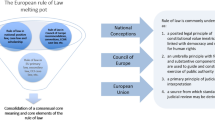Abstract
Commenting on Randall Peerenboom’s analysis of an October 2014 decision by China’s ruling Communist Party on legal reform, I make two points here. First, I argue that Peerenboom’s in my view inaccurate account of (positivistic and naturalist) liberal conceptions of law prevents him from understanding the implications of this decision’s deeply illiberal commitment to power concentration and Party supremacy over law. This account fails to appreciate the resources which liberalism offers to engage critically with the operation of a legal system such as that of China, where – as I point out drawing on my work on human rights lawyers – repression of legal and political rights advocacy have been worsening. Second, I suggest that both the Decision and Peerenboom’s analysis do not fully take into account the nature and scope of the challenges the Party-State is facing, especially the challenge arising from an increasing momentum for civic activism and civil disobedience.
Similar content being viewed by others
Notes
‘CCP Central Committee Decision Concerning Some Major Questions in Comprehensively Moving Governing the Country According to the Law Forward, translated by Rogier Creemers and Jeremy Daum. https://chinacopyrightandmedia.wordpress.com/2014/10/28/ccp-central-committee-decision-concerning-some-major-questions-in-comprehensively-moving-governing-the-country-according-to-the-law-forward/?utm_source=The+Sinocism+China+Newsletter&utm_campaign=57cbf7cd4e-Sinocism10_29_1410_29_2014&utm_medium=email&utm_term=0_171f237867-57cbf7cd4e-29606421&mc_cid=57cbf7cd4e&mc_eid=dcccecffb2. 28 October 2014.
Hart (1994).
Peerenboom (2002).
Peerenboom, doi:10.1007/s40803-015-0003-9. Section 2.
Peerenboom, doi:10.1007/s40803-015-0003-9. Section 3.
Fuller (1969).
Peerenboom, doi:10.1007/s40803-015-0003-9. Section 3.2.
Such an assessment might have to be made of the post-Mao reforms, although in my view, there have been contradictory developments, and the system has I some ways got better.
Shapiro makes this very clear. Scott Shapiro, What Is the Internal Point of View? http://digitalcommons.law.yale.edu/cgi/viewcontent.cgi?article=2338&context=fss_papers. 1 January 2006.
Hart (1994, p. 117).
Hart (1994, p. 210).
Peerenboom, doi:10.1007/s40803-015-0003-9. Section 2.
Peerenboom, doi:10.1007/s40803-015-0003-9. Section 3.3.
For a discussion of one of these, the shuanggui or ‘two prescribed’ system, see Donald Clarke, Discipline Inspection Commissions and Shuanggui Detention. http://lawprofessors.typepad.com/china_law_prof_blog/2008/03/shuanggui-and-e.html. 1 March 2008.
Art. 5 of the Constitution states that ‘[…] All State organs, the armed forces, all political parties and public organizations and all enterprises and institutions must abide by the Constitution and other laws. All acts in violation of the Constitution or other laws must be investigated. No organization or individual is privileged to be beyond the Constitution or other laws.’ http://www.npc.gov.cn/englishnpc/Constitution/node_2825.htm.
Nathan (2015).
Pils (2014).
ChinaLawTranslate (2014), posted in translation 11 December.
Peerenboom, doi:10.1007/s40803-015-0003-9. Section 3.1.
China Digital Times (2013). The author currently is serving a prison sentence for his role in this movement.
Johnson (2014).
Social media communication by a human rights lawyer (anonymised), October 2014.
References
Articles and Blog Pieces
China Digital Times (2013) Xu Zhiyong: On the New Citizens’ Movement. http://chinadigitaltimes.net/2013/05/xu-zhiyong-on-the-new-citizens-movement/. Accessed 2 Sept 2015
Clarke D (2011) China’s Jasmine Crackdown and the Legal System, Chinese Law Prof Blog. http://lawprofessors.typepad.com/china_law_prof_blog/2011/05/chinas-jasmine-crackdown-and-the-legal-system.html. Accessed 2 Sept 2015
Clarke D (2014) Discipline Inspection Commissions and shuanggui detention. Chinese Law Prof Blog. http://lawprofessors.typepad.com/china_law_prof_blog/2008/03/shuanggui-and-e.html. Accessed 2 Sept 2015
Committee to Support Chinese Lawyers (2011) Legal Advocacy and the 2011 Crackdown in China. http://www.csclawyers.org/advocacy/. Accessed 2 Sept 2015
Fuller LL (1969) The morality of law, rev edn. Yale University Press, New Haven and London
Hart HLA (1994) The concept of law, 2nd edn. Oxford University Press, Oxford
Jiang S (2010) Written and Unwritten Constitutions: a New Approach to the Study of Constitutional Government in China. Modern China 36(1):12–46
Johnson I (2014) China’s Unstoppable Lawyers: an Interview with Teng Biao. New York Times. http://www.nybooks.com/blogs/nyrblog/2014/oct/19/china-rights-lawyers-teng-biao/. Accessed 2 Sept 2015
Liu S (2011) I’ve Only Begun To Scratch the Surface. http://www.siweiluozi.net/2011/08/ive-only-begun-to-scratch-surface-liu.html. Accessed 2 Sept 2015
Nathan A (2015) Contribution to ‘Is Mao Still Dead?’ ChinaFile. http://www.chinafile.com/conversation/mao-still-dead. Accessed 2 Sept 2015
Ng T (2011) Making People vanish. http://pjmooney.typepad.com/my-blog/2011/09/making-people-vanish.html#tp. Accessed 2 Sept 2015
Peerenboom R (2002) China’s long march toward rule of law. Cambridge University Press, Cambridge
Pils E (2014) China’s human rights lawyers: advocacy and resistance. Routledge, Abingdon
Schmitt C (2007) The concept of the political, expanded (ed) (1932), trans. by G. Schwab. University of Chicago Press, Chicago
Shapiro S (2006) What is the Internal Point of View? Yale Law Faculty Scholarship Series. http://digitalcommons.law.yale.edu/cgi/viewcontent.cgi?article=2338&context=fss_papers. Accessed 2 Sept 2015
Broadcasts
Sackur S (2014) Hardtalk Interview with Ai Weiwei: ‘In Prison, Nothing Protects you’. http://www.bbc.co.uk/news/world-asia-pacific-26613538. Accessed 2 Sept 2015
Laws and official documents
ChinaLawTranslate (2014) Guangzhou Public Security Bureau Opinion in Support of Prosecution; Pretrial Doc. (20143 No. 0476) of 25 November 2014. http://chinalawtranslate.com/en/tangjingling/. Accessed 2 Sept 2015
Constitution of the People’s Republic of China, adopted at the Fifth Session of the Fifth National People’s Congress and promulgated for implementation by the Announcement of the National People’s Congress on 4 December 1982, last amended on 14 March 2004. http://www.npc.gov.cn/englishnpc/Constitution/node_2825.htm. Accessed 2 Sept 2015
Author information
Authors and Affiliations
Corresponding author
Additional information
This article is a commentary to doi:10.1007/s40803-015-0003-9.
E. Pils: Reader in Transnational Law, King’s College London and Non-Resident Senior Research Fellow, NYU U.S.-Asia Law Institute.
Rights and permissions
About this article
Cite this article
Pils, E. China, the Rule of Law, and the Question of Obedience: A Comment on Professor Peerenboom. Hague J Rule Law 7, 83–90 (2015). https://doi.org/10.1007/s40803-015-0005-7
Published:
Issue Date:
DOI: https://doi.org/10.1007/s40803-015-0005-7




